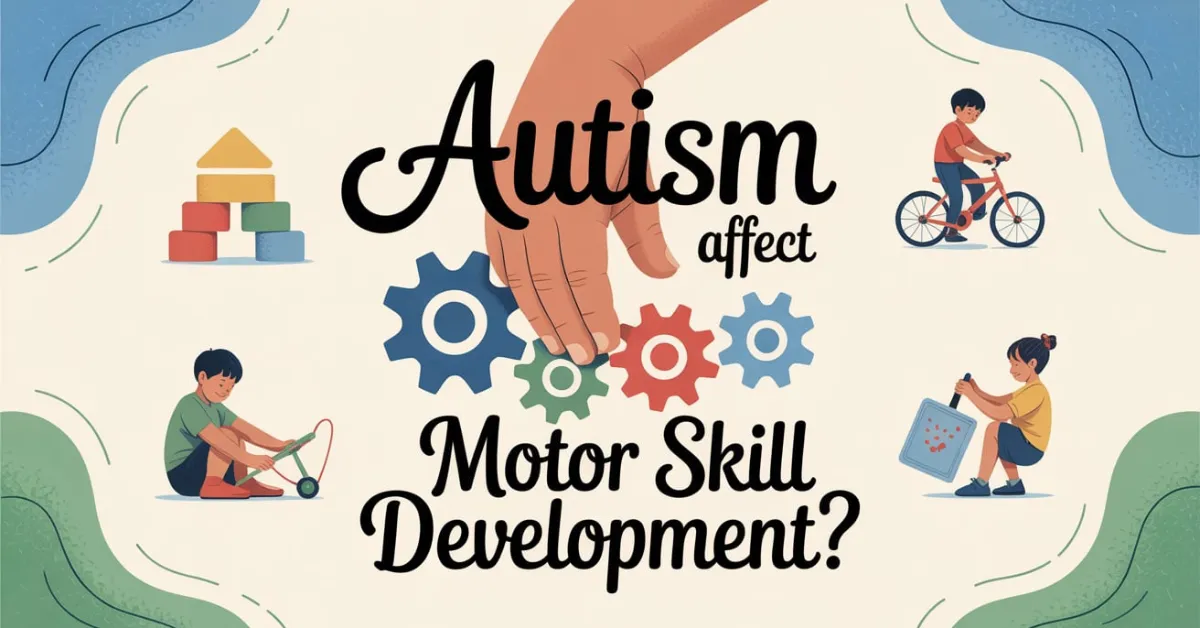Autism Affect Motor Skill Development is a disorder that involves the development of a child, learning, as well as movement. The other significant aspect of the development of a child regards the way the child develops their motor ability. These are our abilities to manipulate our bodies- running, jumping, trying to hold a spoon, and drawing a line. In this article, we will explore how autism affects motor skill development in children. You will find out why this is so, what it entails, and how early help could help significantly.
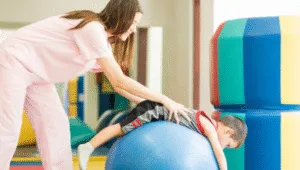
What Are Motor Skills?
Motor skills are what we do with our hands, feet, and body. They assist us in doing the easy stuff, like tying shoelaces or catching a ball.
- Gross motor skills are big movements, such as crawling, walking, or bowling.
- Fine motor skills are actions, small movements of his fingers or small parts of them, like using a pencil or picking up a small block.
Usually, this knowledge is picked up by kids one step at a time as they mature. However, children with Autism affect motor skill development frequently are delayed in these steps.
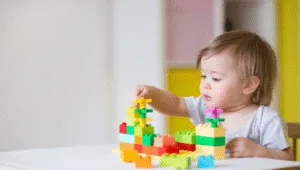
What Is Autism and Why Does It Matter in Movement?
Autism is also known as Autism Spectrum Disorder (ASD), and it influences the way the brain functions. It causes difficulties in talking, playing, and even walking among the kids. Every child with autism is a unique child, although not all children with autism are the same. However, numerous of them demonstrate motor delays.
So, how does autism affect motor skill development? It is found that children who have autism might have:
- Poor control of muscles
- Problems with equilibrium
- Problems reproducing movements
- Slow walking, crawling, or clumsiness
- Irritable or wooden gestures of a body member
These difficulties may turn simple tasks difficult and even frustrating to the child.
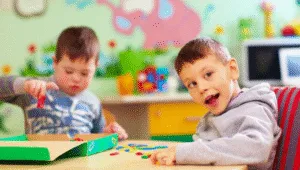
What Does Research Say About Autism and Motor Skills?
Autism affect motor skill development. A reliable research conducted by the National Institutes of Health indicated that children with autism enormously lagged in their gross and fine motor skills. For example:
- 6.7 percent experienced troubles with gross motor skills
- 38.5 percent had issues with fine motor tasks
This implies that most of the children affected by autism might not be able to walk until late, hold weakly, or refuse to do something such as drawing or picking up scissors.
In addition, the research demonstrates that motor deficits were usually more pronounced with increasing age.
How the Brain and Body Work Together in Autism
The brain gives motor ability. The brain lets the body know what to do – when to move, balance, and the strength to grip. There is a possibility that this brain-body message is not functioning in children with autism.
Notice that this could occur because:
- The movement zones in the brain could expand unequally
- Children can be confused over sensory messages, such as touch or balance
- The child can be overwhelmed by sounds, sights, or feelings
Therefore, the brain might not be able to manage muscles in an appropriate manner even when muscles are fine.
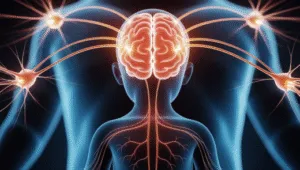
Early Signs That Autism Affects Motor Skills Development
Here are some early signs that might show how autism affect motor skill development:
- It is not the right age when a baby crawls
- difficulty in walking or running
- Trips frequently or appears to be clumsy
- Unstrong at holding a spoon or crayon
- Complains and throws a fit when it is time to complete physical chores
- Does not jump, catch, or climb in games
When you feel any of these, you should start to discuss it with a therapist or doctor.
How Therapists Help Autism Motor Skill Development Delays
Once the delays are identified early enough, the intervention will start early as well! Physical therapists and occupational therapists in pediatrics help children learn to move better.
The following can be improved through therapies:
- Muscle strength
- Harmony and stance
- Hand control
- Eye-hand coordination
- Attitude toward movement
For example, some therapists may even use pediatric physical therapy for plagiocephaly (a head shape condition), especially when it relates to movement delays in babies.
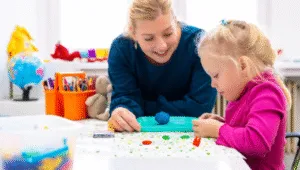
Everyday Challenges Caused by Motor Delays in Autism
Play is not the only area where motor delays can create a problem. They influence school life and everyday living as well. Children may:
- Difficulty copying or cutting out paper
- Stay out of the playgrounds or sports
- Be excluded from group work
- Easy fatigue when doing hard labor
Be sad or angry that they cannot do what they are able to do as other people can. Knowledge in this enables friends, parents, and the teaching staff to favor the child.
Why Age Matters: The Older the Child, the More Visible the Delay
Autism affect motor skill development. Researchers have revealed that with the increase in age, children with autism will exhibit motor defects more conspicuously. What appears to be minor in a toddler can become greater complications in school-going children.
Early detection is therefore very crucial. The earlier we assist, the more abilities a child will develop.
How Parents Can Support Their Child’s Motor Growth
These are the ways with the help of which parents can assist the child with their motor development at home:
- Allow time for outdoor play
- Give toys that make hands strong (playdough or puzzles)
- Use conceiving forms of fun games, such as line walking or hopping
- Give your child a chance to assist in the kitchen to stir or pour
- Make practicing brief and enjoyable, do not compel the motions
Well, the greatest, above all, are the small victories to be honored. Even minor gains are huge successes!
School Support for Motor Skill Development in Children with Autism
In most institutions, there are special programs for children with motor delays that are provided through therapy lessons. This may contain:
- School occupational therapy, which helps with poor handwriting skills
- Special education plans (IEPs)
- Adaptive physical education courses
- In the classroom, devices such as pencil grips or tilted writing boards, Parents may cooperate with teachers and therapists and develop a plan that would suit the child.
How to Spot Progress in Motor Skills Development
As children progress, the change is slow, but with time, it does occur. Signs of progress are:
- Bigger steps in control
- Manual work without assistance
- Taking an interest in new activities
- Smiling or being proud of playing
Keep in mind, each child takes his or her own roadmap. Don’t rush. Power beats speed.
Does Every Child With Autism Have Motor Delays?
Not all children with autism possess big motor difficulties. Autism affect motor skill development. There are those people who may have no problems. Small delays might only be experienced by others.
However, it also never hurts to look at the start. Better to ask than not to ask.
Tools and Exercises That Help Motor Growth
Autism affect motor skill development, treaters and parents can apply with such tools as:
- Sensory swings
- Therapy balls
- Weighted toys
- Teaching activities (playdough, finger games, ie, string lacing or bead sorting)
These make learning actually fun – and kids love it!
When to See a Professional for Autism Motor Skill Development Delays
Talk to:
- A pediatrician
- A neurologist of child neurologist
- An occupational therapist or physical therapist
They will be able to confirm the motor skill development of your kid and develop a healthy, beneficial program.
How Does Autism Affect Motor Skill Development from Birth to Age 5?
Autism affects motor skill development. Most children roll, crawl, walk, hold toys, and play with blocks between their birth and their age of five years. In children with autism, these steps either arrive late or are omitted. An infant with autism may fail to lift their head, crawl, and grasp objects at impressions as compared to other children of the same age. This happens because autism affects motor skill development right from the start. It is very important to detect these signs early at age 5 so as to ensure that the children move and grow better.
Fine Motor Skills Delay in Autism: What It Means for Daily Life
Fine motor skills are used to assist us in doing things by using our hands. As an example, operating a fork, tying shoes, or buttoning a shirt. A good number of children with autism have problems with such small hand activities. They may have their crayons tightly clenched or have some difficulty in zipping their jackets. This shows how autism affects motor skill development, especially when it comes to fine movement. These delays interfere with the feelings of the child in everyday life by building feelings of frustration in him or her. They do not want to draw and color as it is difficult. This also impacts their school work because they cannot write and cut shapes.
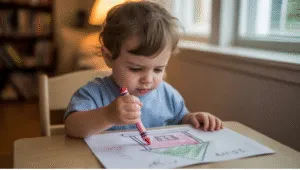
Struggles with Hand Tasks: Drawing, Holding, and Building Blocks
In case you provide an autistic child with a pencil or a toy, he or she may be unable to hold it properly. Their hold may be too strong or too weak. They do not necessarily love to draw or play with blocks. These struggles show how autism affect motor skill development, especially fine motor coordination. These children might not want to deal with puzzles, craft, or LEGO sets since the control of their hands is not solid. In the long run, their learning, imaginations, and emotional development may also be affected by avoiding these tasks.
Why Early Motor Delays in Autism Affect Motor Skill Development
Do not wait when a child who has autism, exhibit motor delays. The earlier the assistance starts, the more satisfactory the outcomes will become. Motor delays are not just a phase, as they may also impact learning, speech, and social ability. That’s why knowing how autism affect motor skill development can lead to faster support. Using early therapy assists children in gaining strength, authority, and confidence. Pediatric occupational therapy milestones to expect can help guide this process. Babies with even delays in turning their heads, crawling, or grasping can enjoy the benefits of professional assistance immediately, including pediatric physical therapy in the case of plagiocephaly, which requires treatment of both the morphology and movement of the head.
Can Autism Affect Motor Skill Development Differently in Boys and Girls?
Yes, children with autism (boys and girls) might appear to be motor delayed in various ways. Studies reveal that boys receive an earlier diagnosis since symptoms are more pronounced. The female students can conceal their problems more or appear more reserved. But both can show how autism affects motor skill development, just in different ways. Physical therapy helps kids with these developmental challenges. For instance, girls may have problems in fine motor activities, but in gross motor skills, boys may have delays. This is why it is all the more important to follow the movements of every child, and not the behavior or the speech.
Is There a Genetic Link Between Autism and Motor Skill Development Issues?
Yes, science demonstrates to us that genetics may be a factor. A portion of the genes associated with autism is also responsible for regulating the motion of the brain. This means that autism affects motor skill development at a brain level, even before birth. In case of motor delays or the autism characteristics of a parent or a sibling, the child is more prone to experience them as well. Not only is the environment important in this, but also how the body and brain of the child are wired initially. This is the reason why family history is important when early assessment of motor skills is conducted.
How Culture and Environment Influence Motor Delays in Autism
Babies who belong to some cultures are more carried around, and less as to floor play. In others, children are allowed to play outdoors. This can change how autism affect motor skill development in each place. It can be explained by a child with autism in one country having greater delays, merely due to fewer opportunities to move around. The parents do not notice the delay at times since the child is not supposed to perform a lot of jobs individually. This is why the environment is an issue. Even a motor problem can be improved in that a child with autism can develop his or her skills through active homes with safe play and daily routines.
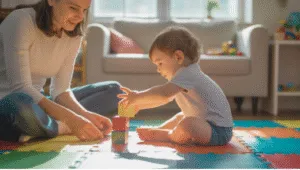
How Teachers and Schools Can Support Motor Skill Growth
Schools contribute very much towards the better mobility of kids. Simple motor activities could be proposed by the teachers every day, such as tracing, cutting, climbing, or dancing. Occupational and physical therapy can be included in the school plan of the child through the special education team. This support helps when autism affects motor skill development during learning. Pencil grips, slanting desks, fidget items, and gym games can also be given at schools. Such minimal modifications would go a long way toward the children who have balance, control, or fine motor strength problems.
New Scientific Studies on How Autism Affects Over Time
Recent research demonstrates that without treatment, motor delays in autism do not automatically disappear with age. Delays can remain unchanged, or they can increase in the absence of therapy. This proves that autism affects motor skill development in lasting ways, not just in the early years. Autistic children are also found to move with the help of other regions of the brain during a scan of brain scan. The scientists are also discovering how locomotion is connected to speech and social development as well. In the future, motor skills will become a more significant feature in the global treatment protocols of autism.
Global Research Shows the Same Patterns
According to research conducted in most nations, this is the case; autistic children are usually affected by motor delay. Regardless of the place of these people, the outcomes are similar.
This implies that it is a worldwide problem, and awareness should increase across the board.
Hope and Success Stories
Lots of autistic children with motor skill development delay have an opportunity to study and develop properly with assistance. Children who were not able to walk at the age of 3 are now dancing, biking, and playing sports at the age of 7 years old-only by getting early assistance.
It is every child’s right to do that.
Final Thoughts
Autism Affect motor skill development. Put simply, it is a problem of autism impacting the development of motor skills, where children face the difficulty of moving, playing, and using their muscles, similar to other children of their age. Possible effects on such delays include worse motor skills and fine motor skills, from walking to writing. However, early assistance overturns all that. Deprivation becomes empowerment when there is therapy, love, waiting, and attention.
FAQS
1-How does autism affect motor skill development?
Autism affect motor skill development may also increase the difficulty for children to acquire both big and small motor skills, such as using their hands or running.
2-At what age do children with autism show motor delays?
Motor delays may present as early as a few months, and problems may include crawling or reaching out to objects.
3-Does early intervention promote motor competence in children who have autism?
Yes, early treatment can assist children in enhancing motor skills, strength, and even balance.
4-Does the autism condition interfere with both gross and fine motor skills?
And yes, an autistic child may find it hard in physical movements (running, jumping) as well as in small activities (drawing, writing).
5-What can parents do to help in the development of motor skills?
Autism affect motor skill development. Parents are encouraged to promote outdoor activities, have toys to develop hand-eye coordination, and train easy tasks such as climbing or building blocks.

